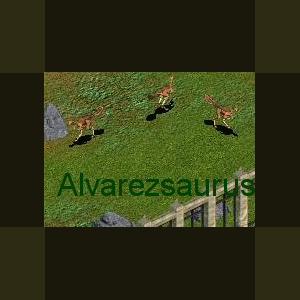About This File
The Alvarezsauridae are an enigmatic family of small, long-legged running dinosaurs. Although originally thought to represent the earliest known flightless birds, a consensus of recent work suggests that they are primitive members of the Maniraptoriformes. Other work found them to be the sister group to the Ornithomimosauria. Alvarezsaurs are highly specialized. They bear tiny but stoutly proportioned forelimbs with compact birdlike hands and their skeleton suggests they had massive breast and arm muscles, possibly adapted for digging or tearing. They have tubular snouts, elongate jaws, and minute teeth. They may have been adapted to prey on colonial insects such as termites. Alvarezsaurids range from 0.5.2 m (20-80 inches) in length, although some possible members may have been substantially larger, including the European Heptasteornis (also called Elopteryx) that may have reached 2.5 m (8 ft).
At least one species of Alvarezsaurid, Shuvuuia deserti, has down-like, feathery, integumental structures that are preserved in the fossil. Schweitzer et al. (1999) subjected these filaments to microscopic, morphological, mass spectrometric, and immunohistochemical studies and found that they consisted of beta Keratin, which is the primary protein in feathers.
Alvarezsaurus, and thus Alvarezsaurinae, Alvaresauridae, and Alvarezsauria are named for the historian Don Gregorio Alvarez, not the more familiar physicist Luis Alvarez, who proposed that the Cretaceous-Tertiary extinction event was caused by an impact event.
The type species is A. calvoi. It was bipedal, had a long tail and its leg structure suggests that it was a fast runner. It may have been insectivorous and was basal to better-known members of its family, such as Mononykus and Shuvuuia. It has been alternately classified with both non-avian theropod dinosaurs and early birds



Recommended Comments
Create an account or sign in to comment
You need to be a member in order to leave a comment
Create an account
Sign up for a new account in our community. It's easy!
Register a new accountSign in
Already have an account? Sign in here.
Sign In Now